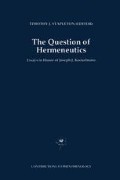Abstract
The history of the twentieth century reads like a running feud between technology and human values. Modern technology hit human cultures with the force of an invasion: it armed the nations with airplanes, submarines, and nuclear arsenals; revved up communications with radio and television; and now offers options for irreversibly altering the natural environment through genetic engineering.
Access this chapter
Tax calculation will be finalised at checkout
Purchases are for personal use only
Preview
Unable to display preview. Download preview PDF.
Notes
The statement was made by Ralph Holibaugh, director of the Olin and Chalmers libraries at Kenyon College. It appeared in The Kenyon College Annual Report 1988–90. p. 5.
From the preface to Wegmarken (Frankfurt: Klostermann, 1967), my translation.
See Don Ihde’s Technology and the Lifeworld: From Garden to Earth (Bloomington: Indiana University Press, 1990).
What Computers Can’t Do: The Limits of Artificial Intelligence (New York: Harper Colophon, 1972; revised edition, 1979).
Mind over Machine: The Power of Human Intuition and Expertise in the Era of the Computer (New York: Macmillan Free Press, 1985).
See “Endgame: Deep Thought Stalks the Masters” by Don Steinberg in PC Computing (July 1990), p. 144–49.
The history of this chess match appears in Howard Rheingold’s Tools for Thought: The People and Ideas behind the Next Computer Revolution (New York: Simon & Schuster, 1985), pp. 161–62. Dreyfus explains what he takes to be the point of the match in Mind over Machine, p. 112.
A prime instance of this shift is the interest in cyberspace. A number of papers on various aspects of cyberspace appear in the volume Cyberspace. edited by Michael Benedikt, (Cambridge: MIT Press, Spring 1991). The term “cyberspace” originated with the novels of William Gibson who used science fiction to explore the symbiotic connection of human and computer. Harry Stevens at MIT refers to computers that support communication as “cotechnology”; he uses the term to mean the collaborative networking of humans via computer.
In Hebel—der Hausfreund (Pfullingen: Günther Neske, 1957); translated as “Hebel — Friend of the House,” in Contemporary German Philosophy Volume 3 (University Park: Pennsylvania State University Press, 1983), translation by Bruce Foltz and Michael Heim, pp. 89–101.
In Parmenides (Frankfurt: Vittorio Klostermann, 1982), originally lectures given in the winter of 1942–43, Volume 54 of the Gesamtausgabe, my translation; the interpolations in brackets are mine. In this passage, Heidegger is commenting on the ancient Greek notion of “action” (pragma),pp. 118–19.
From the preface to Wegmarken (Frankfurt: Klostermann, 1967), my translation.
A recent study that locates Heidegger’s theory of technology within the cultural reaction of the Weimar Republic is Michael Zimmerman’s Heidegger’s Confrontation with Modernity: Technology, Politics, Art (Bloomington: Indiana University Press, 1990).
In a letter to Jonathan Miller (April 1970), in The Letters of Marshall McLuhan, selected and edited by Marie Molinaro, Corinne McLuhan, and William Toye, (Oxford: Oxford University Press, 1987), p. 406.
Letter to John Culkin (September 1964), Letters, p. 309.
Letter to Buckminster Fuller, (September 1964), Letters. p. 398.
In a letter to Jonathan Miller (April 1970), McLuhan wrote: “I take it that you understand that I have never expressed any preferences or values since The Mechanical Bride. Value judgments create smog in our culture and distract attention from processes. My personal bias is entirely pro-print and all of its effects.” In other places McLuhan will not be so open about his stance. In writing to Eric Havelock (May 1970), for instance, he says: “My own studies of the effects of technology on human psyche and society have inclined people to regard me as the enemy of the things I describe. I feel a bit like the man who turns in a fire alarm only to be charged with arson. I have tried to avoid making personal value judgments about these processes since they seem far too important and too large in scope to deserve a merely private opinion.” Letters, pp. 405 and 406, respectively.
From The Gutenberg Galaxy: The Making of Typographic Man (Toronto: University of Toronto Press, 1962), p. 66, in a section entitled “Heidegger surfboards along on the electronic wave as triumphantly as Descartes rode the mechanical wave.”
Jonathan Kamin, for instance, describes the outliner program ThinkTank and writes, “Children who grow up using ThinkTank, or a program like it, may develop the capacity to handle large amounts of information, and to structure it at an early age. Thus, they may be able to solve problems more effectively than their elders.” In The ThinkTank Book (Berkeley: Sybex, 1984), p. 218. The book elaborates on the powers of a program written by Living Videotext for “idea processing” on the microcomputer. The program makes possible rapid manipulation of hierarchically arranged data (text) so that it creates a “database managing system” for organizing a piece of writing as it occurs in the human-computer interface. While the statement cited refers specifically to outliner programs, many others attribute positive changes to word processing as such. At the 1984 meeting of the American Philosophical Association, for instance, Professor Janice Moulton wrote: “What are the philosophical implications of these changes? With word processing we will be able to think more carefully and deeply.”
Howard Rheingold gives a good account of Engelbart and Nelson in his Tools for Thought: The People and Ideas behind the Next Computer Revolution (New York: Simon & Schuster, 1985).
Electric Language: A Philosophical Study of Word Processing (New Haven: Yale University Press, 1987; paper 1989). See also the first five chapters of my more recent book, The Metaphysics of Virtual Reality (Oxford: Oxford University Press, 1993).
Editor information
Editors and Affiliations
Rights and permissions
Copyright information
© 1994 Springer Science+Business Media Dordrecht
About this chapter
Cite this chapter
Heim, M. (1994). Heidegger and Computers. In: Stapleton, T.J. (eds) The Question of Hermeneutics. Contributions to Phenomenology, vol 17. Springer, Dordrecht. https://doi.org/10.1007/978-94-011-1160-7_17
Download citation
DOI: https://doi.org/10.1007/978-94-011-1160-7_17
Publisher Name: Springer, Dordrecht
Print ISBN: 978-0-7923-2964-0
Online ISBN: 978-94-011-1160-7
eBook Packages: Springer Book Archive

